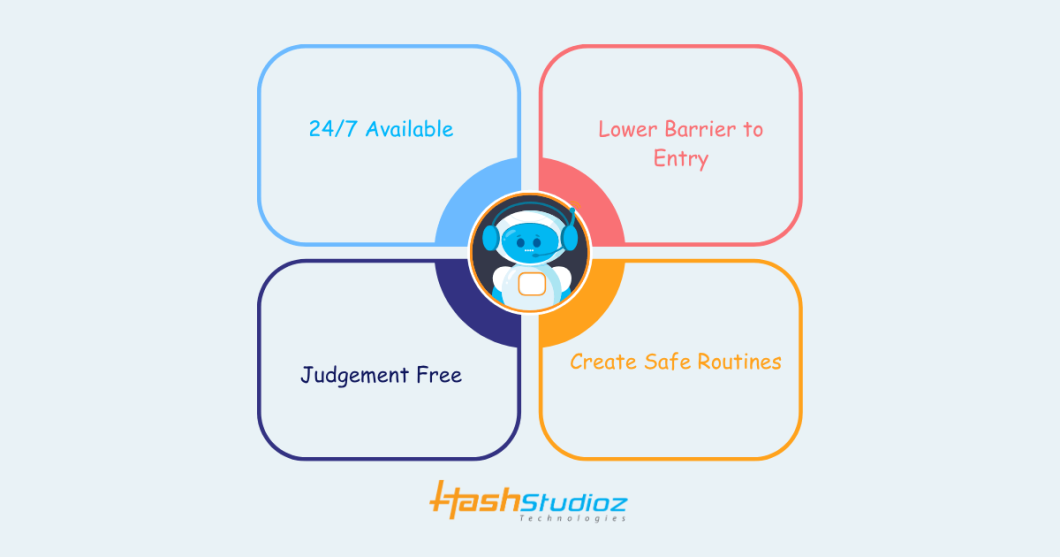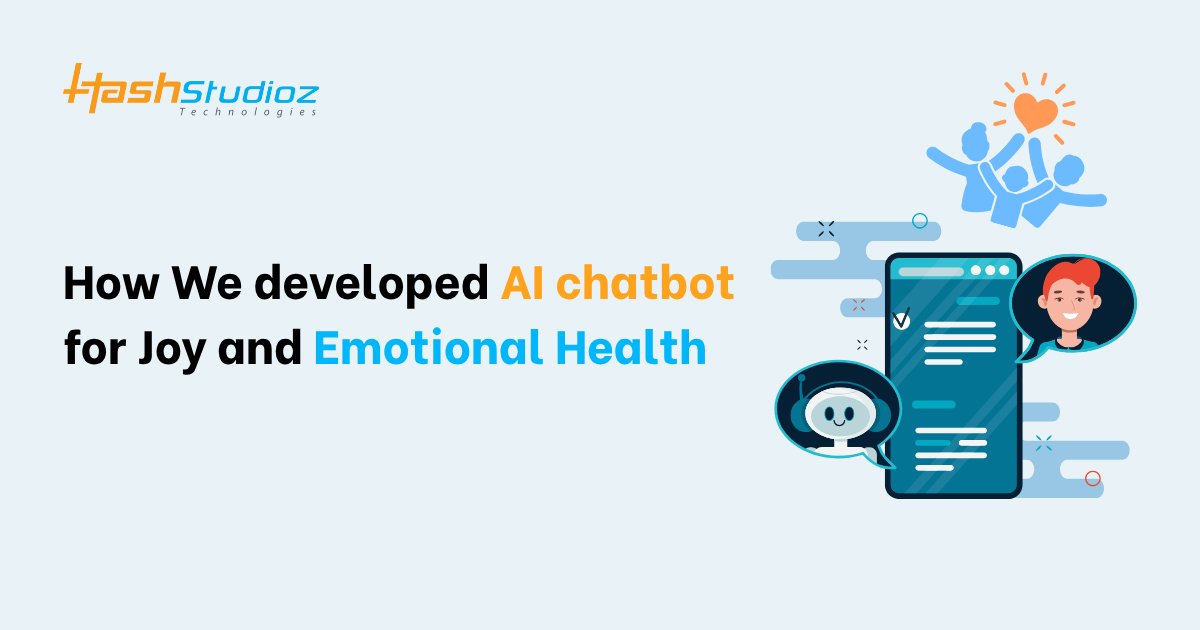Mental wellness isn’t just about crisis management anymore; it’s about small daily check-ins, emotional balance, and even noticing moments of joy. As more people open up about mental health, another quiet revolution is happening alongside it: the rise of the AI chatbot.
But let’s clear one thing up: these aren’t robotic customer service bots. We’re talking about emotionally aware AI chatbots designed to listen, support, and help people reflect, all through simple, human-like conversations.
Recently, our team worked on a project that brought this to life: an AI chatbot for a mental wellness and joy-tracking app. It wasn’t just a cool tech exercise. It was a glimpse into how smart, empathetic tools can make emotional support more accessible.
This blog is about what we built, what we learned, and how AI chatbot development can be used to make a real difference in people’s lives.
Table of Contents
- Why Mental Health Needs Tech Support
- The AI Chatbot We Built for Mental Wellness
- Behind the Scenes of the Chatbot Development Process
- Why AI Chatbots Actually Work for Mental Health
- How AI Chatbots Can Do Even More
- The Privacy Piece: Non-Negotiable
- What Joy Looks Like in Data
- Want to Build an AI Chatbot That Supports People?
- Final Thought
Why Mental Health Needs Tech Support
Let’s start with the big picture.
- Around 1 in 5 adults in the U.S. lives with a mental illness.
- Over 60% of young adults feel persistently sad, anxious, or stressed.
- And nearly half of those who need help don’t get it due to cost, access, or stigma.
(Sources: NAMI, CDC)
At the same time, people are turning to their phones for mental wellness help. Apps, online therapy, and mindfulness tools are booming. The mental wellness app market is projected to hit $10 billion+ by 2027, and AI is quickly becoming part of the solution.
So, the question becomes:
Can AI chatbots help people feel better, every day?
Our experience says yes and here’s how.
The AI Chatbot We Built for Mental Wellness
We recently developed a custom AI chatbot for a mental wellness app called JoyScore, which helps users track their emotional health and daily joy.
What It Can Do:
- Understand how a user feels using NLP and sentiment analysis
- Offer empathetic responses, not scripted replies
- Suggest wellness prompts: breathing, journaling, gratitude, etc.
- Protect privacy with secure, encrypted design
It’s not just another chatbot. It’s an AI companion one that checks in when you’re feeling off and celebrates you when you’re doing well.
Behind the Scenes of the Chatbot Development Process
Building an AI chatbot for mental wellness was both a technical and emotional challenge. We needed to make sure it didn’t just work; it had to feel right.
Here’s how we approached the chatbot development:
1. Emotion-First Intent Detection
We mapped out emotional cues like “I feel anxious,” “I’m overwhelmed,” or even “I don’t know what’s wrong.” The bot learned how to recognize emotional tones and adjust its response.
2. Therapy-Inspired Flows
We collaborated with mental wellness professionals to design conversations that were supportive but not clinical. Think gentle prompts, reflection, and encouragement, not canned advice.
3. Privacy and Security by Design
All interactions are encrypted, minimal data is stored, and users are always in control of their chat history because mental health data deserves extra care.
4. Lightweight, Scalable Architecture
We made the chatbot flexible enough to be reused across apps, websites, or even wearables, whether it’s for mental wellness, life coaching, or mood journaling.
Why AI Chatbots Actually Work for Mental Health
We’ve seen firsthand that the right kind of AI chatbot can have a real emotional impact.
Here’s why they’re so effective:

- They’re always available: No scheduling, no waiting, no 3-week therapy gaps.
- They lower the barrier to entry: Especially for those new to mental health conversations.
- They’re judgment-free: You can talk about anything, anytime.
- They create safe routines: Like daily check-ins, gratitude prompts, or self-reflection.
In our user testing, people didn’t just use the chatbot; they built habits with it.
Some checked in every night. Others used it to track mood patterns. And many said they felt more seen than expected even when talking to a bot.
How AI Chatbots Can Do Even More
The AI chatbot we built was just one example. But the same logic and development approach can be used across a ton of other scenarios.
Education & Youth Support
Imagine a chatbot that helps students navigate stress, exam anxiety, or even friendships without fear of judgment.
Workplace Wellness
Companies can integrate mental health chatbots into HR portals or Slack, giving employees a safe space to decompress and reflect.
Post-Therapy Coaching
After therapy or coaching sessions, chatbots can help with reinforcement, daily check-ins, journaling prompts, progress tracking, and habit building.
Culturally-Aware Support
With the right training data, chatbots can adapt tone and language to specific cultures, making support more inclusive and empathetic.
The key is custom chatbot development where we build bots with specific goals, target audiences, and emotional tones in mind.
The Privacy Piece: Non-Negotiable
When you’re dealing with emotions, trust is everything.
In our JoyScore chatbot build, we made privacy and consent a top priority:
- Minimal data collection
- End-to-end encryption
- Clear opt-ins for emotional data use
- User control over history and preferences
For anyone thinking about building an AI chatbot for health or wellness, don’t skip this step. Trust builds adoption.
What Joy Looks Like in Data
One of the most exciting parts of our chatbot project was tracking joy, not just problems.
Every time users engaged with gratitude prompts, mindfulness exercises, or joyful moments, the chatbot helped reflect those back. Over time, that created visible trends in their mood and mindset.
That’s a huge win. Because mental wellness isn’t just about solving issues, it’s also about recognizing progress.
Want to Build an AI Chatbot That Supports People?
We’ve done it and we’re ready to do it again.
If you’re building a product in mental wellness, coaching, lifestyle, or emotional support, AI chatbots can add real value not just as a feature, but as a genuine support tool.
Let’s talk about how chatbot development can bring more empathy and intelligence to your product one conversation at a time.
Final Thought
AI will never replace human care, but it can make care more reachable, more consistent, and even a little more joyful.
Whether it’s helping someone pause and breathe, reflect on their day, or build a better habit, the right AI chatbot can make a real emotional impact.
And that’s the kind of tech we’re proud to build.

